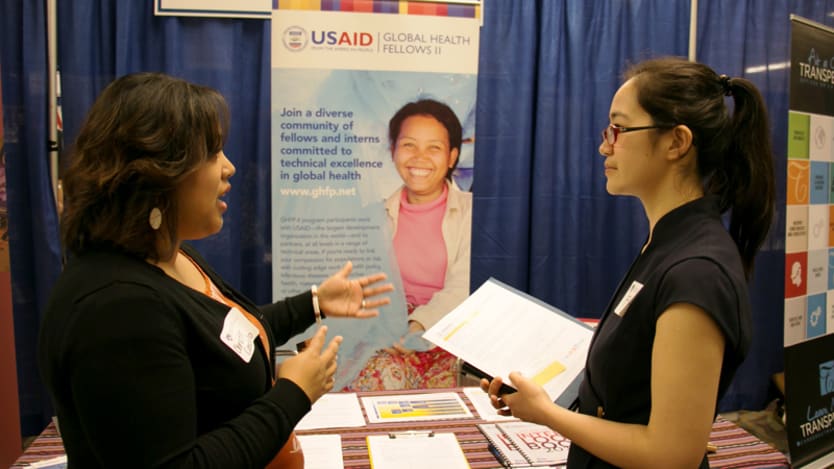Why a master's in international development is still a popular degree choice

For those considering the lure of the classroom, getting a master’s degree in international development is a popular option. In fact, it was rated the most “in-demand” degree two years in a row by global development recruiters Devex surveyed.
However, other degrees are picking up steam with an master’s in business administration rated as the second most in demand degree followed by graduate degrees in economics, econometrics or statistics and a master’s degree in public health.
So, what is it about a master’s in international development that will help set you apart? Devex spoke to three leading schools to find out what their programs have to offer and why a graduate degree in international development is still the number one pick.
Practical experience and hard skills
Giving students a range of both practical and academic skills is a common theme among the graduate programs Devex spoke to. Graduates are taught to “bridge the gap between policy and practice” and land jobs working at a range of organizations within the sector, according to career advisor and former development worker, Scott Webb, at Middlebury Institute of International Studies at Monterey.
More on choosing a graduate degree:
► 12 graduate degree programs to further your global development career
► Opinion: Value of an MPP program from a private sector perspective
► Why global development professionals, recruiters are on the MBA bandwagon
Webb described the teaching style as a combination of “immersive and practical,” with students learning “hard skills” such as how to write and manage budgets and proposals, alongside broader concepts about “drivers of poverty” and the “global system” of development. Topics range from migration, social change organizational management and leadership, and environmental sustainability, to complexity and systems thinking.
The international development program offered at George Washington University takes a different approach to ensuring students get their practical experience fix.
“Employees are really looking for people with both a degree and practical experience,” said Christina Fink, from the Elliott School of International Affairs, and a result, classes don’t start until after 5 p.m. in order to leave students’ days free to take on internships and pro bono consulting.
When not interning, students at GWU take classes on a range of topics including climate change and community development, gender and development, and democracy and governance.
Second-year students also undertake two weeks field-based research, working with a specific organization, known as “the Capstone Project”.
At Duke University, most students taking the Master of International Development Policy program already have several years experience working in the development sector, typically at NGOs or within government. Cory Krupp, the course director, said the master’s is therefore designed to be “flexible” and geared toward students filling specific gaps in their knowledge. She listed some of the available courses including monitoring and evaluation, service delivery systems, project management, designing and analyzing public private partnerships, international energy systems and sustainability and governance.
The U.K. Institute for Development Studies offers specialized one-year master’s-level degrees in development, including specific concentration in gender, climate change, governance, participation, power and social change, and globalization and business.
Linda Waldman, director of teaching and learning at IDS, said all courses are designed to give students an understanding of the main theories, concepts and debates in the development field, both historical and contemporary, as well as get comfortable with a range of research and analytical methodologies and tools. Throughout, students are encouraged to think about the policy and practice options in their specializations.
A wide variety of career options
Graduates of the Middlebury program generally finish school ready to work as program managers for NGOs. This fits with what Webb sees as a trend in the industry towards hiring local staff for technical roles, while relying on international hires to fill more general, managerial roles.
Webb himself is a good advertisement for the program having secured jobs with NGOs including Catholic Relief Services after graduating. He also said he “routinely” referred to templates and documents he’d been given as a student while working in the field.
For Krupp, most of Duke’s international development program students already work in development but are looking to transition. For example, someone who has experience working in the field but who wants to take a position in government will need to take classes in “more ministry line work such as budget analysis or fiscal decentralization,” she said. Her course is designed to fill such knowledge and skills gaps.
Waldman sees IDS as a gateway for “the next generation of development leaders” and said many students, the majority of whom come from developing countries, go on to take on “senior roles in their countries, as high-profile government officials, working for donors or in development agencies.” Research is another common pathway for IDS alumni, she said.
Equitable and inclusive solutions
To work in development you need to appreciate the wider “power dynamics implicit in development systems,” and this is something which more “technical” degrees, such as MBAs and MPHs, fail to offer, according to Fink.
Where an MBA or MPH graduate might focus on a technical solution, an ID graduate will “think about how to come up with approaches which are equitable and inclusive,” she said.
Even students wanting to work on private sector development should study ID as opposed to an MBA, according to Krupp. “Development faces unique challenges which are different from the day to day challenges of business and you’re just not going to address those challenges in a business degree,” she said.
Evolving programs for an evolving sector
Because of its unique position as both a university teaching institution, research organization and think tank, IDS try to lead the field when it comes to development thinking, as opposed to trying to stay up to date. The school has “pioneered innovative research methods and development concepts,” according to Waldman, such as participatory action research.
To keep the Duke course “fresh,” Krupp said the school regularly invites speakers and recruits new staff to give specialist lecture series on emerging areas of interest.
Similarly, the syllabus at GWU is updated to reflect current trends and in-demand skills, said Fink. She mentioned courses that had been adapted to reflect the emerging role of “nontraditional” donors in development, such as the BRICS, private foundations and migrant groups sending remittances back to their home countries.
Having staff who both teach development and work as practitioners ensures the course is kept up to date, according to Webb who says Middlebury is proud to have a full-time professional faculty.
If you are considering heading back to graduate school and debating which degree to pursue, join us for a special webinar with speakers from American University Kogod School of Business' MBA Program, George Washington University's M.A. in International Development Studies Program and Harvard Kennedy School's MPA Program on Wednesday, Nov. 2, to discuss how to choose the right grad degree for your global development career.
You know you need a postgraduate degree to advance in a global development career, but deciding on a program, degree and specialization can be overwhelming. Devex and our partners are digging into all things graduate school and global development in a weeklong series called Grad School Week. Join online events and read more advice on pursuing a postgraduate education here.
Search for articles
Most Read
- 1
- 2
- 3
- 4
- 5


